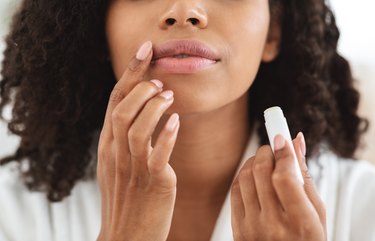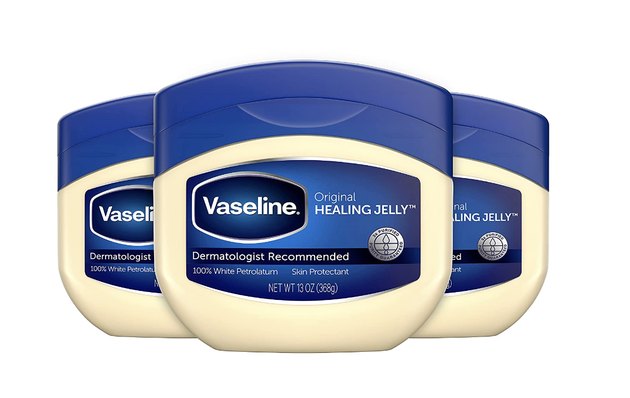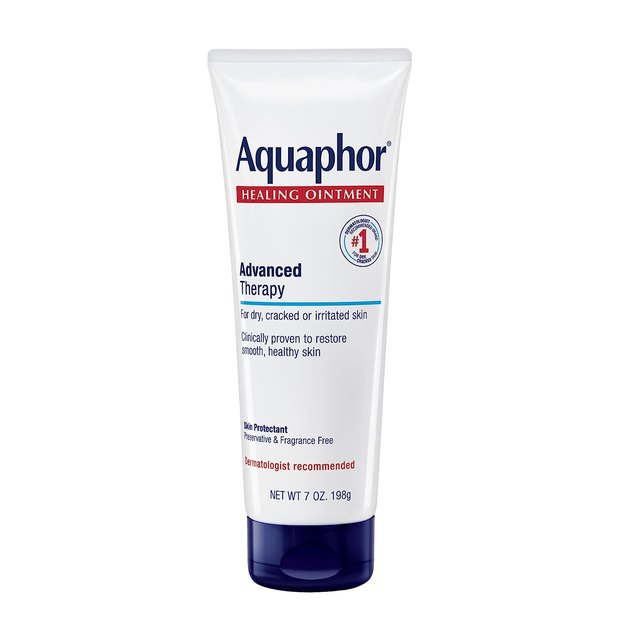
Dry, flaky or cracking skin on the lips — aka, chapped lips — is common in cold weather, but it can happen anytime of year, and to anybody.
"Anyone can get chapped lips," Audrey Kunin, MD, board-certified dermatologist, chief product officer of NovaBay Pharmaceuticals and founder of DERMAdoctor, tells LIVESTRONG.com. "When lips are too dry, the painful cracking and peeling begins."
Video of the Day
Video of the Day
Here's what causes dry, peeling lips and how to heal them.
What Causes Chapped Lips?
Turns out, the skin on your lips is thinner and more sensitive than the skin on the rest of your body because your lips don't have oil glands. This puts them at greater risk of getting dry and chapped, per the Cleveland Clinic.
If you've wondered why your lips are dry and peeling lately though, there can be a few different reasons why. These include:
1. Weather Conditions
"Cold-weather chapping is caused by environmental conditions that lead to dehydration," Dr. Kunin says.
In other words, dry winter air can sap the moisture from your lips, leaving them parched. The same goes for windy conditions. On top of that, when it's cold outside, we tend to turn on the heat in our homes, which produces very dry air.
Too much sun can also be the culprit here, according to the American Academy of Dermatology (AAD). Sun damage can dry out your lips and lead to cracking and peeling (especially if you're not diligent about applying SPF to your smackers.)
2. Dehydration
The hallmark dryness of chapped lips can also occur if you aren't staying well hydrated, per the AAD. One of the effects of dehydration is dry skin, and that extends to the skin on your lips.
Other signs of dehydration include:
- Thirst
- Dark yellow urine
- Headache
- Feeling tired or sluggish
- Constipation
3. Allergies to Certain Products
If your dryness and peeling comes with burning lips, an allergy may be to blame.
It may feel counterintuitive, but your lipstick, chapstick or even your lip gloss could be the culprit, as the "ingredient propyl gallate in lipstick can cause a contact allergy," Dr. Kunin says.
If you started using a new lipstick and notice your lips are drier than usual, you may want to stop using that product. (Even products advertised as the "best chapstick" or "best lip moisturizer" could still cause issues.)
Then again, it could be your toothpaste or mouthwash. Some pastes contain the ingredients guaiazulene or sodium lauryl sulfate (SLS), which can cause a contact allergy or skin irritation, Dr. Kunin says. The alcohol and strong mint flavor in mouthwash could also dry your lips. She recommends checking the ingredient label, especially if you began using a new toothpaste recently.
4. Irritants in Food
Dr. Kunin says the red dye or cinnamon flavoring used in candy, lozenges, gum and mouthwash can also cause chapped lips.
Another common culprit? Orange juice.
"The juice from citrus fruits can irritate your lips and cause a reaction that looks like chapped lips," she says.
5. Reactions to Certain Vitamins
Sometimes, a vitamin or mineral deficiency can be the cause of dry lips — like a zinc or iron deficiency, per the Cleveland Clinic. A lack of vitamin A may also cause flaky skin, per the Cleveland Clinic.
But other times, you may be getting too much of a certain nutrient. For example, Dr. Kunin says too much vitamin A can lead to peeling lips and dry mouth, especially if you're taking more than 25,000 IU a day.
She also warns that some people may develop an allergy to cobalt from taking vitamin B12 supplements. "It usually shows itself as unexplained episodes of recurrent lip swelling and crusting, made worse by wind and sun exposure," she says.
6. Medical Conditions
Some medical causes of extremely chapped lips include:
- Actinic cheilitis: A reaction to long-term sun exposure on the lips that most often occurs in people who live at high altitudes or close to the equator and work outdoors, per the American Osteopathic College of Dermatology.
- Candida (yeast) infection: A condition that usually shows up as a scaling and cracking at the outer lip and is particularly common among people with diabetes, per Johns Hopkins Medicine.
- Hypothyroidism: A condition where you don't create enough thyroid hormone (most common in people assigned female at birth who are older than 60), per the Cleveland Clinic.
Additionally, certain medications can cause dry mouth and lips, including antihistamines, antidepressants and some pain medications, per the Mayo Clinic.
7. Snoring
If you snore at night, you might wake up with crusty lips.
"That continuous flow of breath across your lips all night long — caused by enlarged tonsils, adenoids or sleep apnea — can grossly dehydrate your lips," Dr. Kunin says.
8. Stress
Finally, we all know that pretty much any health problem can come down to stress.
"Do you respond to stress by habitually licking or chewing your lips? Continuous contact with saliva — which is chemically constituted to help break down and digest food — can dehydrate and irritate lips," Dr. Kunin says. "Many people are totally unaware of this habit."
She recommends asking your friends and family members if you have a tendency to lick or chew on your lips when you're nervous, and try to be more conscious of the behavior so you can nix it. You can also try to find healthier ways to manage stress, such as deep breathing or meditation.
Chapped Lips Symptoms
There are a few different symptoms that can come with chapped lips, including the following, per the Cleveland Clinic:
- Dry, scaly, cracked or flaking skin
- Sores on the lips or in your mouth
- Itching
- Mild pain
- Redness
- In cases of extremely chapped lips, bleeding might occur
The Best Remedies for Chapped Lips
If you're looking for ways to cure chapped lips fast, you may have to exercise some patience. While chapstick can help ease your symptoms in the short term, there are other home remedies for dry lips that take a bit longer, but will work.
Here are a few chapped lip treatments and prevention tips:
1. Address the Underlying Cause
If your chapped lips are caused by something within your control, such as a certain product you're using or food you're eating, you can solve the issue by avoiding the irritant.
Likewise, if your symptoms are due to the vitamin A or B12 supplements you're taking, talk to your doctor or dietitian about how to adjust your dose or whether you can switch to a different delivery method (like injections, for example).
And if you think you may have a medical condition or even a lip infection, talk to your doctor about appropriate treatment steps and how best to manage your symptoms.
2. Apply Emollients
According to Dr. Kunin, the best thing for chapped lips is emollients such as Vaseline or Aquaphor Healing Ointment. Lip balms with beeswax might help, too (unless you have an allergy to ingredients like lanolin or beeswax, in which case, try a skin test before using).
However, consistency is key here.
"In order for them to work, you need to apply them obsessively," she says. "And I do mean obsessively. The more frequent the application of the emollient, the faster your results."
And if you want a more "on-the-go" and convenient option, you can try lip balms that are fragrance-free, hypoallergenic and have emollients. Try to find products with ceramides, lanolin or shea butter. (Even better, look for a lip balm with SPF, like zinc or titanium oxide, per the Cleveland Clinic.)
3. Use a Humidifier
You can also try cranking up your humidifier, "as it allows moisture to be restored to air and helps prevent and heal chapped lips," Dr. Kunin says.
If you don't have a humidifier, you can humidify the air in your home by getting more plants or air-drying your laundry.
4. Drink More Water
If dehydration is behind your dry lips, try getting more H2O in your day (especially if you're exercising.) This is also a great dry mouth remedy, too.
Most adults need to drink between 9 and 12.5 cups of water per day, according to the Academy of Nutrition and Dietetics.
As a more general guide, you should aim to drink half your body weight in ounces each day. (For example, if you weigh 180 pounds, aim for 90 ounces, or about 11 cups of water.)
5. Ask About Hydrocortisone Ointment
While this isn't a home remedy, your lips may need something more if they are resistant to treatment. Dr. Kunin says she usually prescribes a 2.5 percent hydrocortisone ointment to her patients with seriously chapped lips, which can be applied up to four times a day.
"It's amazing how adding a low-potency steroid ointment can make such a big difference in a lip-healing regimen," she says.
Tip
Note that hydrocortisone ointment will not and should not be prescribed if the underlying cause of your chapped lips is an infection. If that is the case, antibiotics will be prescribed.
How to Prevent Chapped Lips
There are a few ways you can prevent your lips from getting chapped before they start to bother you. Try the following tips, per the Cleveland Clinic:
- Wear lip balm with SPF every time you go outside.
- Apply an emollient to your lips before you go to bed and when you wake up.
- Keep lip balms and ointment handy (at your desk, in the car, etc.).
- Avoid licking or biting your lips as much as possible (as saliva can actually be the thing irritating your lips).
- Keep your humidifier running to prevent dry air.
When to See a Doctor
The average time for chapped lips to heal (if you're using home remedies) is about two to three weeks, per the Cleveland Clinic. But Dr. Kunin says to make an appointment with your doctor if your lips are:
- Painful
- Oozing
- Bleeding
- Not healing after about two weeks
Additionally, in rare cases, dry lips may be due to malnutrition. Other symptoms of malnutrition include the following, according to the NHS:
- Unintentional weight loss
- Reduced appetite or lack of interest in food
- Tiredness or weakness
- Feeling cold
- Long recovery time from wounds or illness
- Feeling low or depressed
If you think you may have malnutrition, see a doctor as soon as possible.
FAQ
Common Questions
Can you get chapped lips from a cold?
If you have a cold and get sinus congestion, you may have a hard time breathing through your nose. The more you breathe through your mouth, the less hydrated your lips will be as they take in dry air. This can cause chapped, dry lips, per the National Health Service. A sore throat may also cause you to drink less fluids, which can cause dehydration and dry lips, too.
Are chapped lips a symptom of COVID-19?
Chapped lips aren't known to be a symptom of COVID-19, per the Centers for Disease Control and Prevention. But if you are having congestion and breathing through your mouth more often (like with the common cold), dry lips can happen, too. Common symptoms of the virus are fever, chills, cough, shortness of breath, muscle or body aches, sore throat and a new loss of taste or smell.
Can stomach problems cause chapped lips?
There is no evidence to suggest that stomach problems can directly lead to chapped lips. However, there is a condition called orofacial granulomatosis (swelling that causes lumps and cracked, itchy lips and inner cheeks) that is often found in people with Crohn's disease (an autoimmune GI condition), per the Cleveland Clinic.
- American Academy of Dermatology: "7 Dermatologists' Tips for Healing Dry, Chapped Lips"
- Academy of Nutrition and Dietetics: "How Much Water Do You Need"
- Centers for Disease Control and Prevention: "Symptoms of COVID-19"
- NHS: "Malnutrition Symptoms"
- Cleveland Clinic: "Chapped Lips (Cheilitis)"
- NHS: "Dry Mouth"
- Cleveland Clinic: "Orofacial Granulomatosis"
- American Osteopathic College of Dermatology: "Actinic Cheilitis"
- Johns Hopkins Medicine: "Yeast Infection"
- Cleveland Clinic: "Hypothyroidism"
- Mayo Clinic: "Dry Mouth"
- Cleveland Clinic Journal of Medicine: "Angular Cheilitis Induced by Iron Deficiency Anemia"
- Cleveland Clinic: "Vitamin A Deficiency"
Is this an emergency? If you are experiencing serious medical symptoms, please see the National Library of Medicine’s list of signs you need emergency medical attention or call 911.

